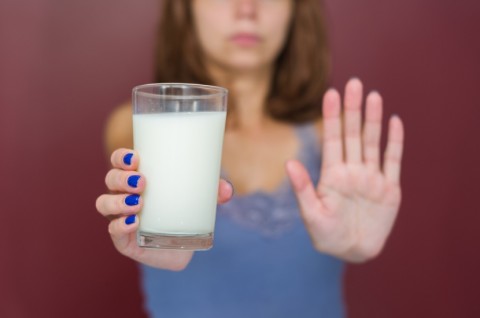DrCarney.com Blog
Three Diseases Linked to Milk Consumption
Milk is one of the most popular drinks of choice among Americans. In fact, the average American consumed about 20.4 gallons of milk in 2010. Unfortunately, cow's milk is not well designed for humans; in reality, it is baby calf growth fluid intended to rapidly grow a small calf to a full grown cow in about a years time. Cow's milk contains cholesterol, fat, minerals, animal proteins, and more than 50 active hormones. Milk proteins are common allergens. In a baby cow, these nutrients and hormones stimulate the needed rapid growth of their body, but these substances can have negative effects on the health of humans who are not designed to grow so fast.
Cow's milk is, for humans, an unhealthy fluid that contains a wide variety of substances that have been linked with several diseases. Some of these diseases linked with milk consumption include:
Cardiovascular Disease
Cardiovascular disease is the leading cause of death worldwide. It accounts for 1 in every 4 deaths in the United States. Some of the risk factors for cardiovascular disease include obesity, high blood pressure, elevated plasma levels of cholesterol and triglycerides, and unhealthy diets. Milk and milk products are packed with an avalanche of cholesterol and saturated fats, unless the fat is removed, as in nonfat milk. Regular consumption of all dairy products elevates blood levels of triglycerides and cholesterol, therefore increasing the likelihood of developing cardiovascular disease. Even nonfat milk boosts levels of cholesterol, triglycerides, and inflammatory mediators that promote cardiovascular disease.
Osteoporosis
Calcium is an important mineral that helps to build and maintain strong bones. The 'high calcium' content of milk is the cornerstone of the marketing strategy used by the dairy industry to promote its products. Surprisingly, approximately 51% of fractures from osteoporosis occur in Europe and the United States— the two highest milk-consuming regions in the world. So, why is cow growth fluid (touted as a rich source of calcium) not helping lovers of milk to build strong bones and prevent osteoporosis? Because the acid-forming proteins in animal milk promote calcium loss from the bones and subsequently increase osteoporosis risk. The more milk, the more acid, and the more calcium is required to buffer that acid. Thus, calcium is leached out of the teeth and bones in an attempt to neutralize the acidic pH caused by the sulfur that is more commonly contained in those amino acidd more frequently found in animal protein as opposed to the less-sulfurous amino acids that comprise plant proteins.
Prostate Cancer
Insulin-like growth factor-1 is a potent cancer-promoting hormone found in abundant quantities in milk and milk products. This hormone plays a key role in the rapid growth and proliferation of cancerous cells and tumors in the prostate. The findings of a 2013 study revealed that men who consumed more than 2.5 servings of dairy products per day had higher chances of developing prostate cancer than their counterparts who drank less than 0.5 servings of dairy products per day. The more dairy, the greater the risk of prostate cancer.
Additional Information:
(1) Health Concerns About Dairy Products
(2) Milk May Raise Mortality Risk
(3) Whole Milk Intake Is Associated With Prostate Cancer Specific Mortality Among Male Physicians
Starch-Smart BloggersScroll Down Page to Leave Comments

We welcome Member Bloggers and make it easy to share your blogs with your friends. Simply sign up for a free membership at DrCarney.com/community.
Your Questions Answered: In Dr. Carney's Starch-Smart® System seminars, written questions from participants are collected beforehand, protecting their privacy. In this informative video presentation, Dr. Carney shares the answer to many of those frequently asked questions - with complex scientific evidence made easy to understand. Learn the answers to what you've always wanted to ask, and so much more!
Preview the "Ask the Doc!" Trailer
When you subscribe to the blog, we will send you an e-mail when there are new updates on the site so you wouldn't miss them.




